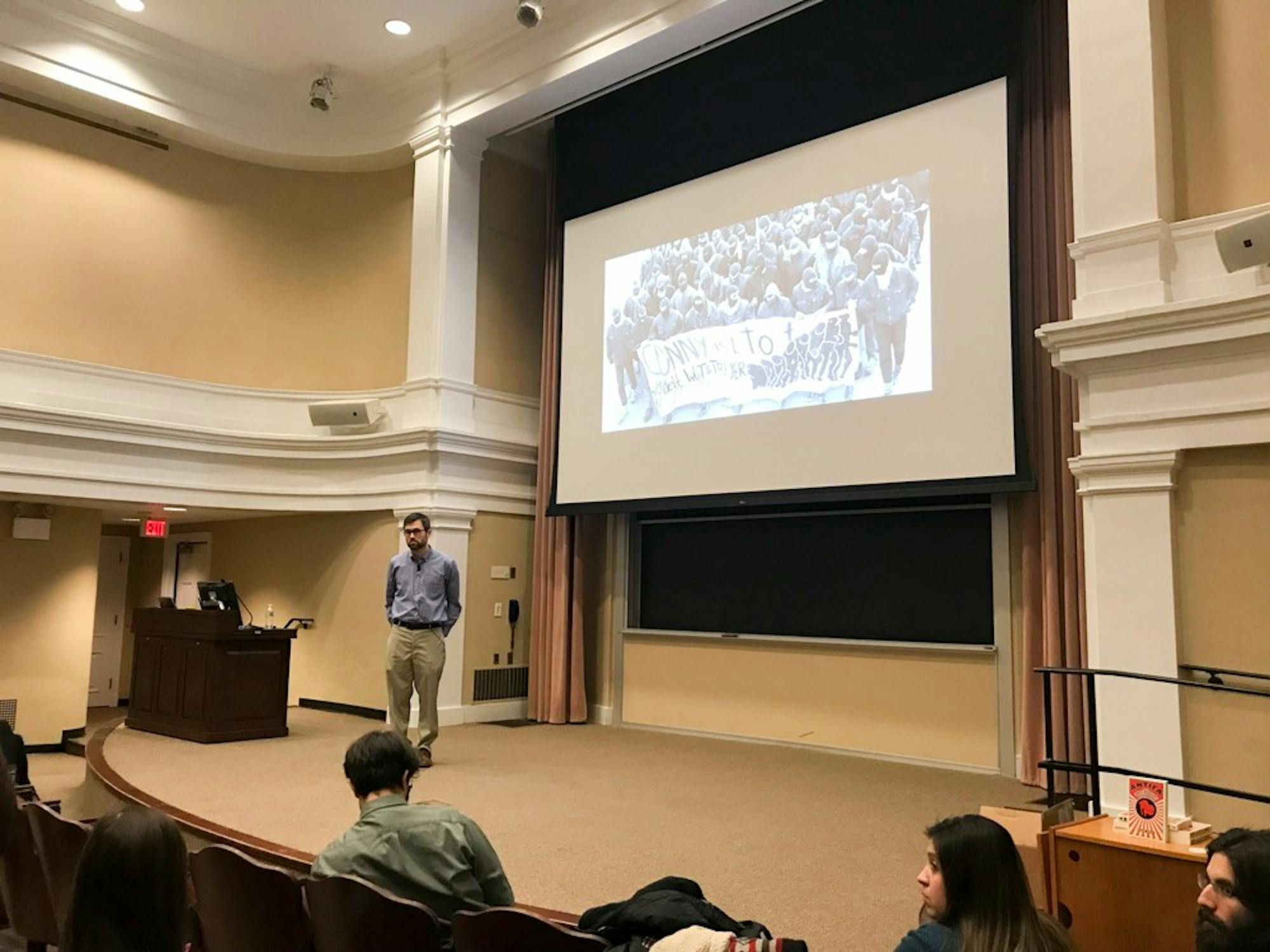Anti-fascism scholar and College history professor Mark Bray gave a presentation yesterday called “Antifa: The History and Politics of Anti-Fascism.” Bray has been a central voice in the debate over the employment of violence by anti-fascist groups, authoring national bestseller “Antifa: The Anti-Fascist Handbook” and speaking out in the media. Sponsored by Dartmouth’s Leslie Center for the Humanities, the lecture took place in Dartmouth Hall and had an attendance of 70 to 80 people, according to Leslie Center director and Italian professor Graziella Parati.
During his lecture, Bray defined Antifa as existing at the intersection of two considerations: “a pan-radical left politics of social-revolutionary self-defense against the far-right,” working to unify the left in an effort to oppose the common enemy of fascism and “a politics of direct action.” He said that rather than relying on the state or groups such as the police or the courts to stop the far-right, movements against fascism must organize through grassroots.
Bray then described the history of Antifa, the origins of many symbols associated with the movement and different branches of the movement around the world.
Overall, according to Bray’s lecture, there has been a reluctance to talk about the anti-fascist movement around the world. He added that his book is the first transnational history of postwar anti-fascism written in English.
“There have been books written in English especially about the situation in Britain and a few studies about other places, but in a post-war context there’s a reluctance to talk about a transnational movement,” Bray said. “That’s one of the main contributions I aim to make with this book.”
Regarding the use of violence by anti-fascist groups, Bray said in his lecture that anti-fascists see their endeavors as activities of self-defense.
“If you look at the history of anti-fascist movements, when they’ve risen and fallen, it’s almost always been in response to the far-right organizing,” Bray said.
He added that within the anti-fascist movement, however, there are two primary understandings of self-defense — a more straightforward rebuttal and a “pre-emptive self-defense” understanding, which allows for first actions taken against fascist groups if violent acts are believed to be imminent.
Bray has come under fire for his views on anti-fascist violence in the past, making an appearance on “Meet the Press” during which he appeared to defend Antifa’s violent tactics. This appearance prompted the College to issue a statement saying that Bray’s views “do not represent the views of Dartmouth.”
After the lecture, Bray fielded questions from the audience on topics such as gender in the anti-fascist movement, media coverage of the movement and the current administration’s relationship with fascist and anti-fascist movements.
In response to a question about fascism in the government today, Bray said that while he does not think that President Donald Trump is a fascist, he believes that Trump’s words and actions have empowered those with white supremacist tendencies.
Parati, who taught French and Italian in Translation 35.02, “Fascisms,” said that she was very pleased with the wide array of historical evidence that Bray presented during his lecture.
The Leslie Center, which Parati described as “an intellectual home for everyone interested in the humanities,” chose to sponsor this lecture because of the topic’s historical relevance.
“History is part of the humanities because history creates narratives about specific moments in time,” Parati said. “We are all in favor of tearing down the barriers that separate the humanities from social sciences and other disciplines.”
Sydney Paluch, a student in the Masters of Arts in Liberal Studies program, said she attended the lecture to learn more about far-left politics “straight from the source.” She added that she was pleased with the accessible way in which Bray presented the information.
“I think [Antifa] is an issue that we don’t have a very good grasp on in our modern media,” Paluch said. “That’s not saying anything against the media. It’s just a very nuanced subject that I think as people in academia, we should have a good grasp on.”
Bray, a historian on human rights, terrorism and political radicalism in modern Europe, is serving as a lecturer in history at the College this year after being a visiting scholar during the 2016-2017 academic year. According to Bray, his change in title reflects the fact that he is now teaching courses at the College. He plans to focus his scholarship next on questions of human rights terrorism around the turn of the 20th century.
Eileen (Eily) Brady is a '21 from Chicago who studies government and romance languages. Eily loves travel, politics, iced tea and her dogs, Mac and Charlie. She is thrilled to be reporting the news for The Dartmouth.




